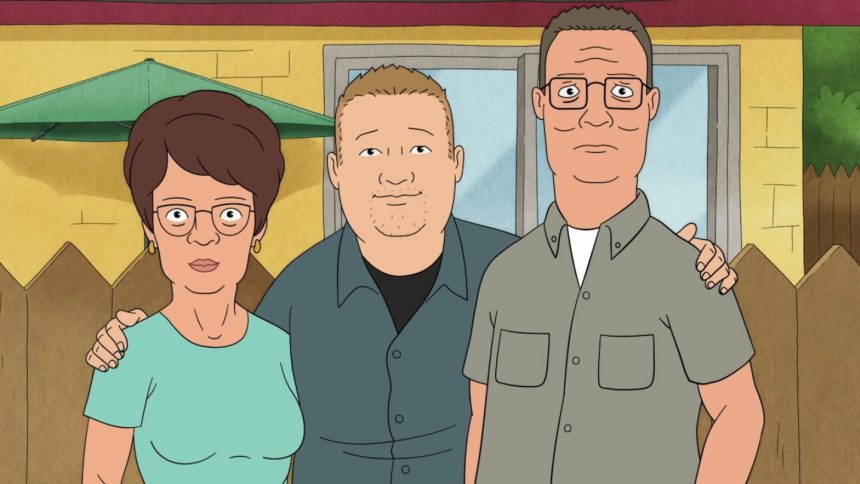‘King of the Hill’ Review: Hank, Peggy and Bobby Move to Hulu for Season 14 Without Skipping a Beat
It isn’t easy to comedically turn the clock back to the 1990s. Just ask Happy Gilmore2, a formless, two-hour blob of Adam Sandler’s family and celebrity friends, with no real creative drive to speak of.
But for several beloved animated shows, what had seemed so difficult for Sandler and company has been made to look relatively easy. Both Beavis and Butt-Head and Futurama, two series that premiered in the late ’90s and have earned multiple resurrections, made smooth transitions to a new era and television and will be premiering new seasons in September. I liked both shows originally, and like both revivals.
Returning first, though, is King of the Hill, which aired from 1997 to 2009. Mike Judge and Greg Daniels‘ Texas-set slice of life, which always seemed right on the edge of going full dramedy in a broadcast landscape that required an exclusive dedication to laughs, ran 250-plus episodes, and while I’d put it just behind The Simpsons and Bob’s Burgers in the Fox Animation Domination pantheon, that’s not bad at all.
Toward the end of its run, the network often seemed to forget that King of the Hill existed, right down to airing four episodes of season 13 only in syndication. So it’s as much for Fox as for fans that I note that this revival of King of the Hill is launching on Hulu, and it’s more for fans than Fox that I note that this revival of King of the Hill is, on the whole, very good.
You Might Also Like
The show’s generally conciliatory ideological worldview manages to be almost a balm in our fractious times without ever feeling excessively treacly and, as was often the case during its original run, its acknowledgement of something resembling the passage of time gives it a dramatic weight that wholly unserialized animated series usually can’t (and don’t aspire to) reach. The result is a satisfying 10-episode 14th season that marks a solid and seamless introduction for Saladin Patterson as showrunner.
The season begins with a time jump and a lot of exposition, yielding a premiere that is both necessary, in terms of bringing audiences back into the fold, and my least favorite installment of this batch.
Hank (Judge) and Peggy (Kathy Najimy) are back in Arlen after several years in Saudi Arabia — much funnier the way Peggy says it — where Hank was serving as assistant manager in charge of Arabian propane and Arabian propane accessories for a Saudi company.
We get some sense of what their life was like in Saudi Arabia, but one key thing is important: They existed in a corporately created residential bubble, which allowed them to miss many details from the evolving culture. As a result, Hank and Peggy are flummoxed upon their return to the U.S. by rideshare etiquette, all-gender restrooms and people being “canceled.” Don’t worry. The season does not become an Unfrozen Caveman Lawyer situation in which the modern world confuses and frightens Hank Hill. This is just something the show has to get out of its system.
Over 25 minutes, the episode catches us up on the important details in the lives of most of its core characters. I will only spoil that Bobby (Pamela Adlon) is 21 and now part-owner and chef of Robata Chane, “a traditional Japanese barbecue with a fusion of flavors and techniques from the German traditions of the Texas Hill Country.” In short order, we’re updated on what’s been up with Boomhauer (Judge), Dale (the late Johnny Hardwick, transitioning into Toby Huss), Bill (Stephen Root) and several other members of the gang through these tumultuous years.
After that opening, though, King of the Hill gets back to the business of simply being King of the Hill, with weekly adventures like Bobby and Hank engaging in a beer-brewing competition and going to a Dallas Cowboys fantasy camp; Kahn (Ronny Chieng, replacing Toby Huss) and Minh (Lauren Tom) celebrating their 30th anniversary and sparking marital insecurity with Hank and Peggy; and something about the Alley Gang hunting feral pigs. There are lots of returning characters from the show’s fairly vast ensemble, and plenty of references that feel less like pandering Easter eggs than acknowledgment of a deep canon.
Most animated shows wouldn’t need any of these updates at all, but King of the Hill likes to handle the real world in ways that are oblique — I don’t think the words “COVID” or “Trump” are spoken directly — but tangible.
After the premiere, the most pointed and meta episode of the season is the third, “Bobby Gets Grilled,” in which Bobby’s attempts to get his preferred charcoal, much to his father’s chagrin, lead to an extended conversation about cultural appropriation. It invariably connects to the show’s decision to recast Kahn with Chieng and Joseph with Tai Leclaire — changes that were noticeable but not obtrusive to me, as somebody who rarely watches King of the Hill repeats.
The storyline’s approach to the debate is wry but accommodating, which fits a series in which the main character (assuming you think Hank is the main character) apparently didn’t vote for Obama and yet is instantly able to eviscerate the lack of empathy from a huckster men’s rights activist. Compassionate conservatism has a place on King of the Hill, if not in our actual political landscape. Hank Hill might bristle at the initial idea of preferred pronouns or whatever, but if somebody told him that the distinction mattered to them as a person, he would figure it out without ranting about wokeness, because Hank Hill is a fictional character who cares about other people, no matter how he might vote. (This is more of a problem with Dale Gribble, whose conspiratorial rantings have been so totally assimilated into the QAnon-adjacent mainstream that I couldn’t bring myself to laugh.)
The deaths of co-stars Hardwick and Jonathan Joss, who voiced John Redcorn, are acknowledged, adding an emotional potency that King of the Hill is better equipped to handle than, say, Happy Gilmore 2 was able to integrate its own brushes with cast mortality.
Death, divorce, addiction and family trauma have always been things King of the Hill treated with internal respect and as much as I laughed at the wacky situations in this run, I was more interested in the casual poignancy of Hank and Peggy confronting the purposeless of retirement or the added shadings to Bobby’s series-long crush on Connie (Lauren Tom) with both characters now in their 20s.
As initially uncomfortable as I was with the idea of Bobby Hill as a character capable of having one-night stands, by the end of the season, I was completely comfortable with the idea that the revival could develop into a semi-serious and thoroughly earned epic love story between Bobby and Connie. If handled well — so far so good — that alone would be enough to justify bringing King of the Hill back. Not that these episodes suggest justification is necessary. Getting to return to Arlen without skipping a creative beat is reason enough.







